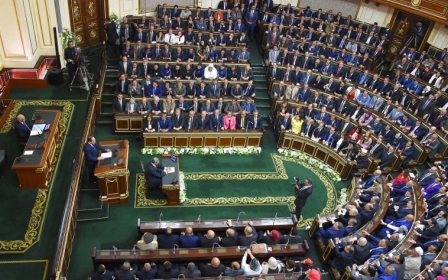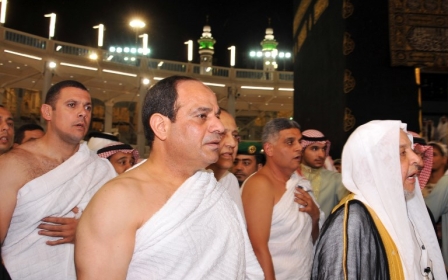Egypt's parliament paves way for Sisi to stay in power until 2034

An Egyptian parliamentary committee has approved a string of amendments to the country's constitution, one of which could allow President Abdel Fattah el-Sisi to stay in power until 2034.
On Tuesday, two-thirds of parliament members voted in favour of the request, submitted by 155 lawmakers to parliamentary speaker Ali Abdelaal on Sunday, to amend a series of constitutional articles, Egyptian media outlet Mada Masr reported.
The successful vote marks the first step to move forward with the proposed changes, which are expected to be finally endorsed by parliament and be voted on in a general referendum in the next few months.
The most significant amendment would be to Article 140 of the constitution, which would extend the limits of Sisi's presidential term from four to six years.
The proposed changes also include a transitional clause that would reset the clock, potentially allowing Sisi to stay in power until 2034, according to a draft seen by Reuters.
Stay informed with MEE's newsletters
Sign up to get the latest alerts, insights and analysis, starting with Turkey Unpacked
In essence, the change would allow Sisi to stay in power for two, six-year terms beyond 2022, when his second mandate as president is set to end.
"This is a constitution made for a pharaoh," said Mohamed Zaree of the Cairo Institute of Human Rights Studies, as reported by the news agency. "It gives a lot of authority with no accountability."
This is a constitution made for a pharaoh. It gives a lot of authority with no accountability.
- Mohamed Zaree, Cairo Institute of Human Rights Studies
Sisi came to power in 2013 following a military coup against Egypt's first democratically elected president, Mohammed Morsi, of the Muslim Brotherhood.
Sisi, an army general at the time of the coup, resigned from his military role and ran for president in a general election in 2014. His candidacy was endorsed by Saudi Arabia, the United Arab Emirates and the United States.
He has since been accused of leading a crackdown on his political opponents and detaining thousands of opposition voices, including leading Egyptian human rights activists.
Among the proposed changes to Egypt's constitution, one amendment would give Sisi overarching authority to appoint judges and the public prosecutor.
Another change, this time to Article 200 of the constitution, would make it a duty for the Egyptian military to defend "the constitution and democracy and the fundamental makeup of the country and its civil nature".
Some critics say they fear this change will give the Egyptian army more influence over political life in the country.
The amendments also include a quota guaranteeing women at least 25 percent of the seats in Egypt's parliament, and ensuring parliamentary representation for farmers, youth, and members of the country's Christian minority, among others.
Mada Masr also reported that a proposed amendment would abolish the National Press Authority, to be replaced by an information ministry that will be directly controlled by the Egyptian government.
Middle East Eye delivers independent and unrivalled coverage and analysis of the Middle East, North Africa and beyond. To learn more about republishing this content and the associated fees, please fill out this form. More about MEE can be found here.




